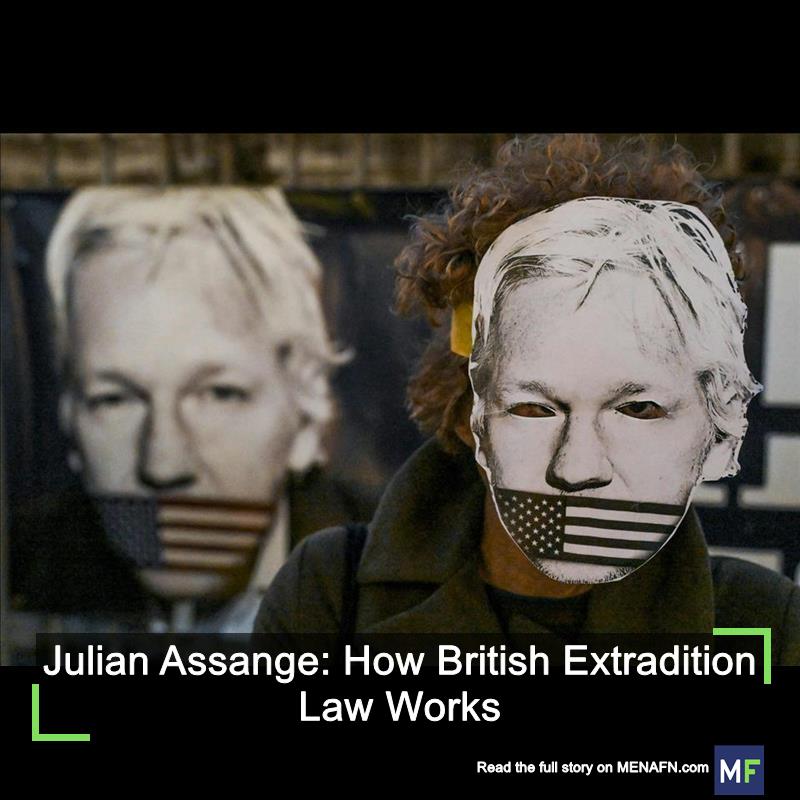
Julian Assange: How British Extradition Law Works
If the US does not provide these assurances, the court will allow Assange to appeal. But if they do provide them, a further hearing in May will decide if the assurances are satisfactory, and make a final decision.
The WikiLeaks founder has spent years attempting to stop his extradition to stand trial on charges of espionage and computer misuse.
The US argues that Assange has put the lives of human intelligence sources in Afghanistan and Iraq at risk by releasing classified documents that named informants in 2010 and 2011. The UK approved his extradition in 2022 following Assange's arrest after he finally left the Ecuadorian embassy in London, where he had been given political asylum.
Extradition in the UK is governed by the Extradition Act 2003. Although the UK is signatory to a number of international treaties on extradition, judges must apply domestic law only. The act sets out several bars to extradition , including human rights. The law does not give judges or politicians discretion to decide whether a person should be extradited – either a bar to extradition applies, or it does not.
Assange has claimed that his extradition would violate the UK-US extradition treaty , which bars extradition for some political offences. This treaty was signed in 2003 as an attempt to strengthen and expedite extradition between the two countries.
But the Extradition Act, introduced into UK law the following year as a reaction to the rise in international terrorism, removed the political offence exemption in UK law. The High Court has rejected Assange's argument that extradition should be barred under the UK-US extradition treaty, because it is only the Extradition Act that the court can apply.
While the US can refuse to extradite for certain political offences, there is no reciprocal bar in UK law. Whether Assange's extradition request relates to political offences has never been considered by a UK court.
Assange's case and that of Clara Ponsati , a Spanish politician involved in the Catalonian independence referendum wanted by Spain for the crime of sedition, have led to calls to reinstate the political offence exception for nonviolent offences.
Extradition and human rightsAssange claims that extradition to the US would breach his rights protected by the European convention on human rights, including his right to freedom of expression . The law requires that all extraditions must be compatible with human rights. However, the threshold required to bar an extradition is high.
There is no doubt that some of the charges against Assange relate to journalistic activity. The right to freedom of expression, however, is a qualified right. This means that it may be restricted on certain grounds, including national security. In UK law, an argument based on this right has never before prevented an extradition.
Assange's wife and legal team address reporters in front of the Royal Courts of Justice. Neil Hall/EPA-EFE
At Assange's extradition hearing, the US prosecutor stated that they would argue that the first amendment (which enshrines freedom of speech and freedom of the press in the US) should not apply to Assange, who is Australian and not a US citizen.
If this were to happen, the High Court held Assange's extradition could risk a flagrant denial of his human rights. The court found that failing to allow Assange to rely on the first amendment because of his citizenship status would also prejudice his trial by reason of his nationality – another bar to extradition in the Extradition Act.
Now, the High Court has asked the US to give three assurances, or promises, that address its concerns. First, Assange will be permitted to rely on the first amendment. Second, he will not be prejudiced at trial (including sentence) because of his nationality and he will be given the same free-speech protections as a US citizen. And, finally, the death penalty will not be imposed.
Death penalty assurances are relatively common, but those relating to specific aspects of a criminal trial are not. Generally, assurances in extradition remain controversial. It is of course important that they are genuine and effective , but there is no set mechanism to monitor them, and therefore no way of knowing whether they have been honoured.
The high-profile nature of Assange's case would offer him protection in this regard. If extradited, his trial and treatment in the US would undoubtedly be widely reported.
What the case tells us about UK extradition lawThis case highlights an inherent conflict in extradition law, between criminal cooperation and reciprocity with other countries, and the protection of human rights. Both the Extradition Act and existing case law lean in favour of extradition. This can only be overcome in rare and exceptional circumstances.
Extradition is based on mutual trust . The High Court's concern over Assange's possible treatment in the US has not yet stopped his extradition, but led to a request for further assurances. The underlying judicial desire to agree to the US extradition request is clear.
Academics and legal experts are currently exploring these controversial issues in a scoping review on extradition and international cooperation for the Law Commission. This could be an opportunity to bring greater clarity to aspects of this complex law.
But improvements to the law in the future will not grant Assange any reprieve – his case is headed towards its end, at least in the UK. If the court decides not to allow him to appeal, he is likely to bring the case higher, to the European Court of Human Rights. Whatever the outcome, Assange's case has brought to the fore the inherent conflicts and complexities in transnational criminal justice.

Legal Disclaimer:
MENAFN provides the
information “as is” without warranty of any kind. We do not accept
any responsibility or liability for the accuracy, content, images,
videos, licenses, completeness, legality, or reliability of the information
contained in this article. If you have any complaints or copyright
issues related to this article, kindly contact the provider above.


















Comments
No comment